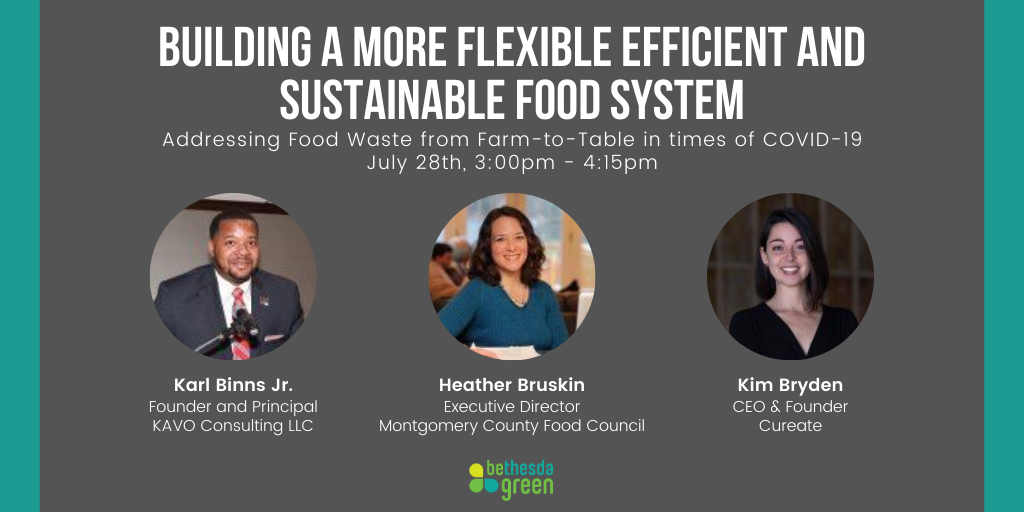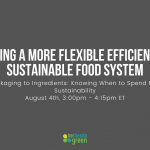Bethesda Green recently kicked off its Summer 2020 Speaker Series: Tackling Environmental Challenges Through Sustainable Entrepreneurship. This series aims to educate and inspire prospective entrepreneurs by highlighting gaps in the market, and challenging them to address those gaps with innovative and sustainable for-profit business solutions. During this series, 18 speakers, including founders, industry experts, and policy makers, are coming together to discuss two primary topics: 1) Building a More Flexible, Efficient, and Sustainable Food System and 2) Establishing a Circular Economy.
The following is a summary of the first session.
Session #1: Addressing Food Waste from Farm-to-Table in times of COVID-19
Speakers included Heather Bruskin, Executive Director of the Montgomery County Food Council, Karl Binns Jr., Founder and Principal of KAVO Consulting, and Kim Bryden, CEO of Cureate.
Watch the full session on YouTube here: https://youtu.be/r-xBZRif_Yg
The US Food System Faces Many Challenges
During this session, panelists began by discussing a number of the existing issues facing underserved communities that were amplified by the pandemic, and how it’s vital to have an equitable and dynamic food system. As the pandemic exploded in March, the food system in the US faced one of the biggest challenges it has ever faced. With schools, restaurants, and key food-access points closed, every business in the industry was forced to pivot. Traditional food insecurity caused by low incomes continues to persist during the pandemic, and the numbers have only gotten worse as unemployment numbers rise. In April 2020, unemployment in Montgomery County more than tripled and over 100,000 county residents have experienced food-access challenges as a result of the pandemic.
Entrepreneurs seeking to help fill the gap are finding it difficult to gain access to commercial kitchens in order to start food related businesses, mentioned Bruskin, who moderated the panel.
With her eye on building a strong local food system to ensure long-term food security for county residents, Bruskin talked about how many of the food-producing farms in Montgomery County lease their land, and questioned the other panelists about how government incentives might alleviate some of these issues.
Binns acknowledged that land ownership is critical for long-term stability, but having the access and capital to purchase massive amounts of land for a traditional farm may not be feasible for most people. However, he expressed hope that entrepreneurs can re-constitute what we think of as a farm, and that repurposing underutilized spaces in urban areas is certainly an option. He believes that abandoned warehouses, shipping containers, and unused urban spaces offer the ability to grow food in non-traditional ways. Through the progression of ag-tech and a growth in alternative protein, Binns sees lots of potential for increasing healthy access to food in cities.
Acknowledging the fact that the average age of farmers continues to increase, panelists discussed how there should be incentive programs to ensure that the next generation of producers can step up and feed people, while also being able to afford to feed their own families. Binns believes that it’s important for every consumer to become more conscious about how food moves from farm to table, and hopes that the pandemic has highlighted a lot of problems that could be opportunities for people to solve. He elaborated on this idea by saying “we always ask young people, what do you want to be when you grow up? We never ask them what problem would you like to solve in the world.” He believes that when agriculture experts are asked about what issues they want to solve, conversations inevitably revolve around food, fiber, and the environment, which all need more talented and conscious problem-solvers.
We always ask young people, what do you want to be when you grow up? We never ask them what problem would you like to solve in the world.
Karl Binns, Jr., Founder, KAVO Consulting
Bryden discussed how large multinational food supply chains can often be inflexible, and that when the pandemic hit, suddenly there were issues with finding staple goods in our stores. She believes that the pandemic has highlighted the importance of small businesses because their ability to be nimble enables them to respond faster during food system challenges, their local supply chains keep money in the local economy, and their diversity gives consumers the ability to shop their values. Bryden gave the examples of a local non-profit called Dreaming Out Loud that just started a CSA for produce grown by black farmers and a DC restaurant called Thamee that took advantage of unused space to start a marketplace featuring a pantry “100% stocked by Black and Brown makers.”
Advice for Entrepreneurs
Bruskin pointed out that as unemployment numbers increase and people are spending more time at home and in the kitchen during quarantine, prospective entrepreneurs tend to be drawn towards starting food businesses. In response, Bryden advised that entrepreneurs listening to the panel need to consider what problems they’re solving for customers. The core of any business is alleviating pain-points for customers, and entrepreneurs need to be cautious about falling in love with the solution, e.g. their cheesecake, before thinking critically about the problem they’re solving. Right now, people are craving comfort, safety, and the feeling of community within their food system, and she challenged entrepreneurs to address these areas of concern.
Bryden gave the example of institutions like grocery stores or hospitals that previously offered hot food bars, but which are now being forced to pivot. As the pandemic continues, she said, hot food bars could be replaced with packaged take-away food and that local restaurants struggling to make up for lost revenue could reach agreements to deliver their packaged food to grocery stores and hospitals.
Bethesda Green’s Summer 2020 Speaker Series: Tackling Environmental Challenges Through Sustainable Entrepreneurship continues on August 4th.
Learn more about our upcoming panels and register here: https://bit.ly/39i6LGK
About the Author:
Sam Wenger is a Summer Intern at Bethesda Green’s Innovation Lab. He is pursuing a Master of Science in Energy and Sustainability from Northwestern University, and recently graduated from Cornell University with a Bachelor of Science in Operations Research & Information Engineering.





